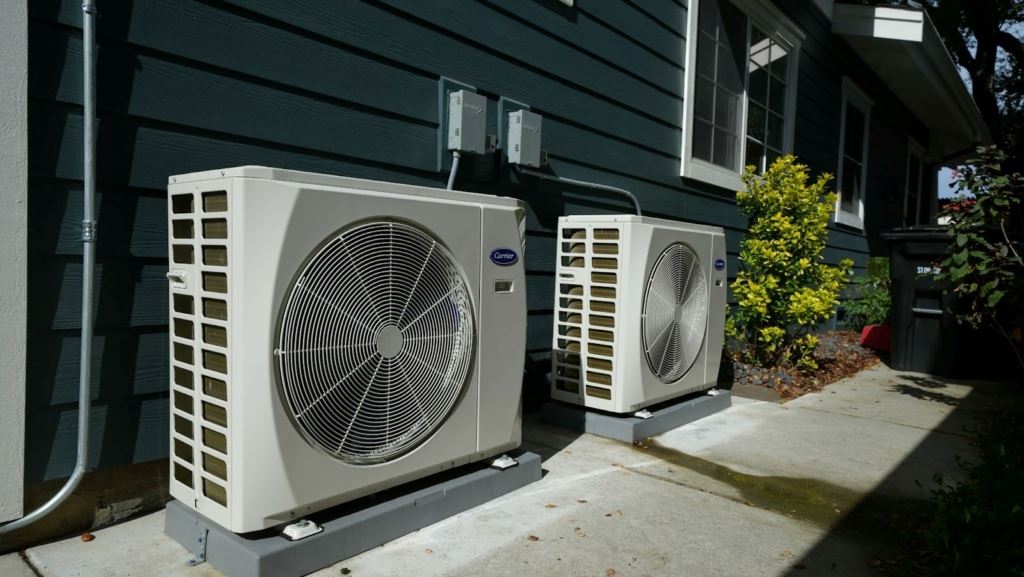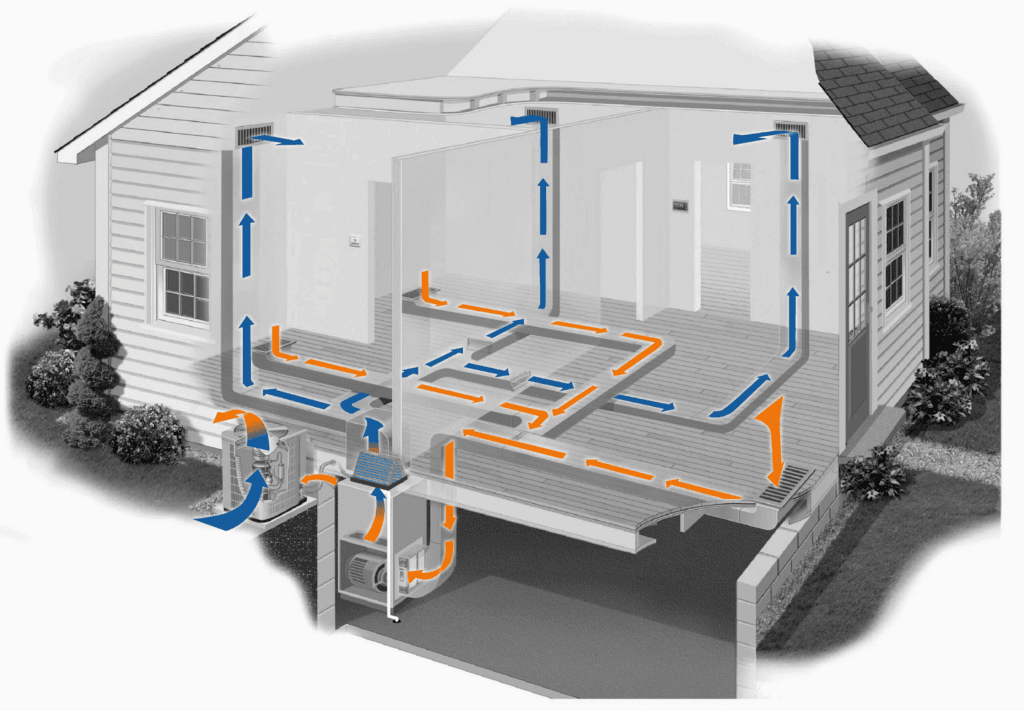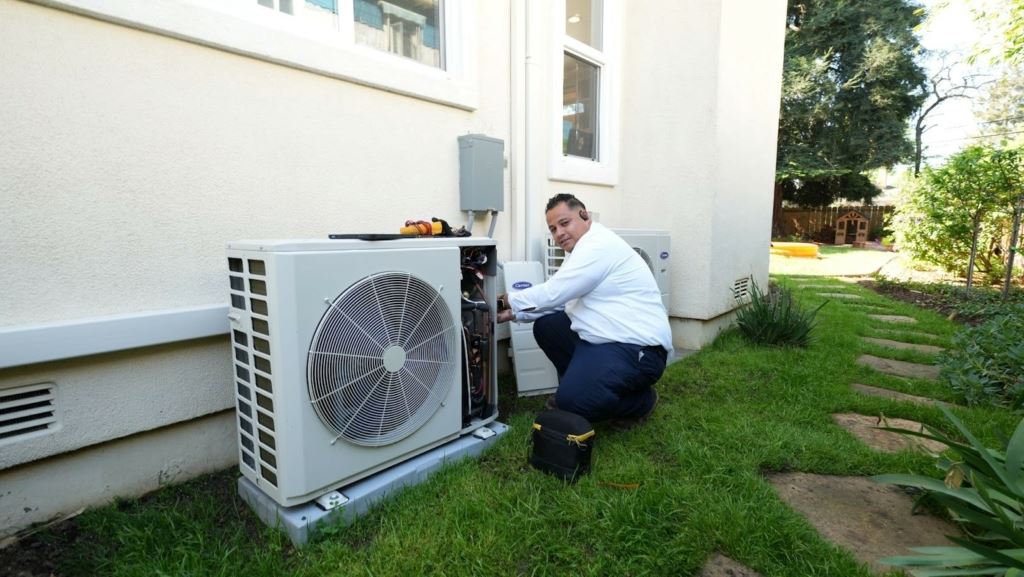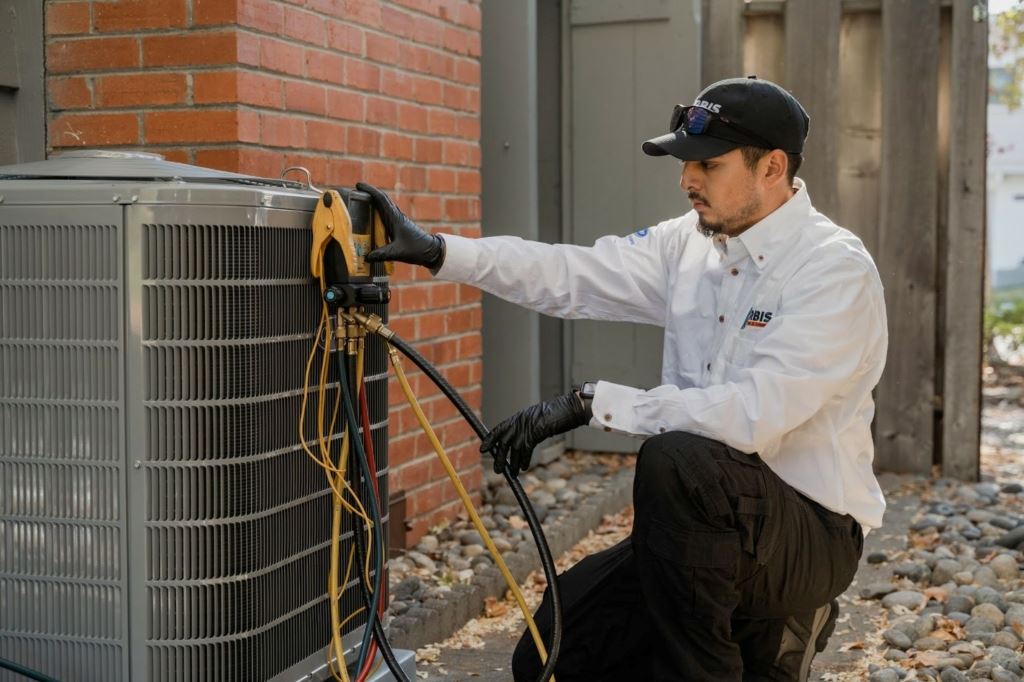
When the summer heat ramps up, a well-functioning air conditioner becomes a necessity. However, a common issue that can disrupt this cool comfort is A/C leaking water: this seemingly small problem can quickly escalate, leading to inefficiencies, potential property damage, and unexpected repair bills. Understanding why these leaks occur and how to address them is crucial for maintaining your air conditioning system’s effectiveness and longevity.
Whether you’re a homeowner looking to safeguard your comfort or having an A/C leak at the moment, this article will equip you with the knowledge you need to keep you cool all summer long.
Basics of an Air Conditioner
To understand the reasons for leaking A/C, it’s essential to start with a basic grasp of how it operates. An air conditioning unit functions by pulling warm indoor air through an evaporator coil, which cools the air by removing heat and moisture. This cooling process is facilitated by a refrigerant, a substance specially designed to absorb and release heat.

How an Air Conditioning System Works:
- Air Intake: The A/C unit draws warm air from inside your home into the system through return air vents. It’s demonstrated by orange arrows.
- Cooling Process: As the warm air passes over the evaporator coils, the refrigerant inside the coils absorbs the heat, cooling the air. This change causes the refrigerant to evaporate from a liquid to a gas. You can see it following orange arrows.
- Heat Release: The gaseous refrigerant then travels to the condenser coils outside your home, releasing the absorbed heat. The moment where there’s a gradient from blue to orange is the heat release.
- Air Circulation: The now-cooled air is pushed back into your home through the air ducts while the cycle repeats to maintain a consistent temperature (blue arrows).
Working air conditioners always involve condensation formation.
As the refrigerant absorbs heat from the air, moisture from the air condenses on the cold surface of the evaporator coil. This moisture is the primary source of water in your A/C system.
This water later drips into a drain pan located under the evaporator coil and flows out of your home through the condensate drain line.
Common Causes of A/C Water Leaks
Understanding the root causes of water leaks from your air conditioning unit is crucial for effective troubleshooting and maintenance. Here are some of the most common reasons why A/C systems begin to leak water:
- Clogged Condensate Drain Line: This is perhaps the most frequent culprit behind water leaks. Over time, algae, mold, dirt, and debris can accumulate in the condensate drain line. If the line becomes clogged, water has nowhere to go and will begin to back up into the home, often leading to visible pooling around the unit.
- Frozen Evaporator Coils: If the airflow through your A/C unit is restricted, often due to dirty air filters or blocked air ducts, the evaporator coils can get too cold and freeze. Once the ice on the coils melts, it can overwhelm the drain pan, leading to an overflow.
- Damaged Drain Pan: The drain pan may crack or corrode over time, especially in older units. Any damage to the drain pan can cause water to leak out of the A/C unit instead of being properly drained away.
- Improper Installation: If the A/C unit is not installed at the proper level, it can cause improper water flow through the drainage system. Similarly, if the unit is too low on refrigerant, it can lower the pressure in the system, causing the coils to freeze and subsequently melt into an overflow.
- Low Refrigerant Levels: Just as too little refrigerant can cause freezing problems, it can also lead to insufficient cooling and improper functioning of the A/C unit. This imbalance can lead to condensation issues and excess water build-up.
Each of these issues can potentially lead to significant water leakage if not addressed properly. Recognizing these common causes helps homeowners understand when they can attempt a fix themselves and when it might be time to call in a professional. By regularly checking for these issues, you can prevent the majority of common leaks and keep your system running efficiently.
DIY Solutions and Preventative Maintenance
When faced with a leaking air conditioner, there are several steps you can take yourself before calling in a professional. Here’s a step-by-step guide to troubleshooting and potentially solving the problem:
Step-by-Step Troubleshooting Guide:
- Inspect and Clean the Air Filters: Dirty air filters can restrict airflow, leading to frozen evaporator coils and subsequent leaks. Check your air filters monthly and clean or replace them as needed to ensure proper airflow.
- Check and Clear the Condensate Drain Line: This is often a simple yet effective fix. Use a wet/dry vacuum to suck out any clogs from the outdoor drain line. For indoor units, you can flush the line with a mixture of water and vinegar to clear away mold and mildew.
- Examine the Drain Pan: Look for any cracks, holes, or signs of corrosion in the drain pan. If it’s damaged, replacing the pan is a straightforward solution that can prevent water from leaking out.
- Ensure Proper A/C Unit Leveling: An improperly leveled unit can cause improper drainage of condensate. Use a level to check your unit and adjust it if necessary so that it’s slightly tilted towards the drain side.
- Check for Ice on Evaporator Coils: If you notice ice buildup, turn off the unit to let the ice melt, and check for airflow issues or low refrigerant levels. If the coils frequently freeze up, it may be a sign that professional service is needed.
When to Call a Professional

While many air conditioner maintenance tasks can be handled with a bit of DIY know-how, certain situations require the expertise of a professional. Knowing when to call in an expert can save you from exacerbating the problem and potentially incurring higher repair costs. Here are key indicators and situations where professional help is crucial:
- Refrigerant Issues: If you suspect your A/C is low on refrigerant or you spot signs of a refrigerant leak (such as ice buildup on the compressor or hissing sounds), it’s time to call a technician. Handling refrigerants requires special training and certification due to its hazardous nature.
- Electrical Problems: Any issues with the A/C’s electrical components, such as unexplained shutdowns, frequent tripping of the circuit breaker, or visible wear on wires, are best left to professionals. Electrical issues not only pose a risk to your safety but can also affect the longevity and efficiency of your unit.
- Persistent Water Leaks: If you’ve tried all the basic troubleshooting steps for water leaks (such as clearing the condensate line and checking the drain pan) and the problem persists, a professional can help diagnose deeper issues that might not be apparent.
- System Upgrades or Replacement: Installing a new air conditioner or upgrading parts of your system requires detailed knowledge of HVAC design and local codes.
What to Expect From Professional A/C Service:
- Thorough Inspection: A professional starts diagnostics with a detailed examination of your entire system to pinpoint any issues that might be causing problems.
- Efficient Repair or Replacement: Once the problem is identified, a technician will repair or replace necessary parts. They have the tools and parts ready to fix issues on the spot, reducing downtime.
- Expert Advice: After servicing, a professional can offer advice on maintaining your system to prevent future problems. This might include tips on routine maintenance or recommendations for upgrades.
Hire IRBIS If You Face A/C Issues

Ensuring your air conditioner remains in top shape involves more than just regular maintenance—it also means preserving the warranty and ensuring cost-effective solutions when repairs are needed. This is where IRBIS HVAC shines, offering unparalleled service guarantees:
Extended warranty for repairs
Attempting DIY repairs on your air conditioner can often lead to voided warranties, leaving you unprotected against future issues. Choosing IRBIS HVAC ensures that your warranty remains intact, thanks to our professional servicing by certified technicians. Our outstanding workmanship means that only 1-3% of customers experience issues after installation. This gives you the peace of mind that any issues are not only fixed right but also covered under warranty.
Cost-Effectiveness
While it might seem like calling in a professional could be more expensive initially, with IRBIS HVAC, the long-term savings are substantial. Plus, with no subcontractors involved and a strong project management team in place, we ensure each project is completed smoothly and effectively, reducing the likelihood of future problems and unnecessary costs.
With IRBIS HVAC, you’re not just hiring a service; you’re investing in a worry-free, efficient air conditioning experience. Our 100% Satisfaction Money Back Guarantee, comprehensive project oversight, 24/7 customer support, and detailed reporting are all designed to provide peace of mind and satisfaction. Whether it’s day or night, our customer support representatives are ready to assist you, ensuring your system continues to function flawlessly for years to come.
Conclusion
By taking proactive steps to check, maintain, and when needed, repair your air conditioning system, you can prevent many common issues, including disruptive and potentially costly water leaks. Remember, regular upkeep not only helps keep your A/C running smoothly but also extends its lifespan and improves its overall efficiency.
Encouraging proactive maintenance and understanding when professional intervention is required can save you time, money, and the inconvenience of unexpected breakdowns. Stay cool and comfortable by giving your air conditioner the care it deserves, and enjoy a more efficient home environment. Don’t hesitate to reach out to a professional when needed to ensure your system operates at its best for years to come. IRBIS HVAC is here to help—reach out to us whenever you need professional service to ensure your system operates at its best for years to come!
FAQ
Why is my A/C leaking water?
A leaking A/C unit could be due to:
- Clogged Condensate Drain Line: Blocked with debris, causing water overflow.
- Dirty Air Filter: Restricted airflow leads to frozen coils and melting ice.
- Low Refrigerant Levels: Freezes the evaporator coil, resulting in melting ice.
- Damaged Drain Pan: Cracks or rust lead to leakage.
- Improper Installation or Leveling: Incorrect slope prevents proper drainage.
- Faulty Condensate Pump: Malfunction causes overflow.
- Excess Humidity: High moisture levels overwhelm the system.
How often should I clean my A/C’s drain line?
It’s a good idea to clean your AC’s drain line at least once a year to prevent clogs and ensure smooth drainage. If you live in an area with high humidity or use your A/C extensively, consider cleaning it more frequently.
What are the signs of a clogged A/C drain line?
Common signs include water pooling around the unit or in the drip pan, musty odors, or the presence of visible mold around drainage areas. Your A/C may also shut off automatically if it has a float switch that detects clogged lines.
Can a dirty air filter lead to water leaks in my A/C?
Yes, a dirty air filter can restrict airflow over the evaporator coils, causing them to freeze over. When the ice melts, it can overflow the drain pan and result in leaks. Regularly changing or cleaning your air filter can prevent this issue.
How can I tell if my A/C is improperly installed?
Signs of improper installation include uneven cooling, frequent cycling (turning on and off), excessive noise, and water leaks. If your A/C shows these symptoms soon after installation, consult a professional to inspect and possibly reinstall the unit correctly.
What maintenance tasks can I perform to prevent water leaks in my A/C?
Regular maintenance tasks include cleaning or replacing air filters, checking and cleaning the drain line, ensuring the unit is level, and inspecting the condensate drain pan for any damage. Additionally, scheduling annual professional inspections can help catch issues before they lead to leaks.
The post Your A/C Leaks Water and The Solution appeared first on IRBIS Heating, Air & Plumbing | www.irbishvac.com.

